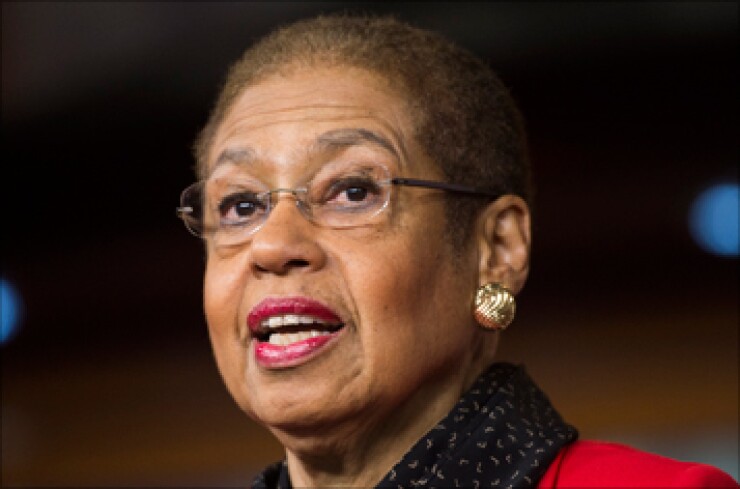
WASHINGTON — A House committee has passed legislation that would block the District of Columbia from having budget autonomy and the ability to spend its local tax dollars without congressional approval.
The House Oversight and Government Reform Committee, which has authority over the district's budget, voted 22 to 14 on Tuesday to approve the Clarifying Congressional Intent in Providing for DC Home Rule Act of 2016 (H.R. 5233) to block the district from passing its annual budget without congressional approval.
The bill had been introduced by Rep. Mark Meadows, R-N.C., chairman of the committee's government operations panel.
The bill would not only repeal the district's Local Budget Autonomy Act of 2012, but also would amend its Home Rule Act of 1973 to clarify the roles of both district government and Congress in the local budget process.
The bill would amend the District of Columbia Code so the district could not make "any change in law, regulation or basic procedure and practice relating to the respective roles of Congress, the president, the federal Office of Management and Budget, and the Government Accountability Office in the preparation, review … authorization and appropriation of the total budget of the District of Columbia government," according to the summary of the bill.
It "restores previous law as though the [Home Rule] Act had never been enacted," the summary reads. "All funds provided for the District of Columbia shall be appropriated on an annual fiscal year basis through the federal appropriations process."
Rep. Eleanor Holmes Norton, the district's non-voting delegate and member of the subcommittee, introduced an amendment to the bill that would grant the district autonomy by an act of Congress, but that was not accepted by the committee.
Norton, a Democrat, said there is a clear difference between the nation's capital and the city that is home to more residents than both Wyoming and Vermont. She said she "resented" a Republican colleague for claiming the district belongs to the nation during the debate on her amendment.
Norton said she expects the bill to go to the House floor "soon."
"Today I asked my colleagues by a congressional act to allow the District of Columbia to have authority over every penny — $7 billion of it — raised in the District of Columbia by the people of the District of Columbia," Norton said. There is a reason there is a difference between the 'nation's capital' and the 'District of Columbia.' While Congress has complete authority over the District, it does not have complete authority over me because I live in the District of Columbia."
District of Columbia Mayor Muriel Bowser's proposed $13 billion budget for fiscal 2017 would be the first in which the district has control over spending its own tax-generated money, which represents about 90% of its budget. Federal law currently states that D.C.'s annual budget must be approved by a two-thirds district council vote as well as an appropriation passed by Congress and signed off by the president.
Bowser last month called for a vote by residents to petition Congress to make the district the country's 51st state, with fiscal independence seen as the first step in what is expected to be an arduous process.
As expected, the Republican-led Congress has opposed statehood because it would likely mean adding more Democrats to Congress from what is historically a liberal stronghold.
House Speaker Rep. Paul Ryan, R-Wis., is among those who back Meadows' calls to block budget autonomy. Rep. Gerry Connolly, D-Va., the subcommittee's top Democrat, on the other hand, said last week he supports D.C.'s move toward fiscal independence. During a subcommittee hearing on the district last week, Meadows warned that passing a budget without final congressional approval could lead to charges against district employees. The district is also currently embattled in a lawsuit alleging the Budget Autonomy Act is unlawful.
The lawsuit, filed in November in the U.S. District Court for the District of Columbia by political watchdog group Judicial Watch on behalf of district taxpayer Clarice Feldman, claims the act violates a provision of the Home Rule Act that states no district funds can be expended by the district unless approved by Congress. Jeffrey DeWitt, the district's chief financial officer, filed a motion to dismiss the suit in February. The House of Representative's bipartisan Legal Advisory Group filed a friend-of-the-court brief urging the judge to deny dismissal. The suit's status remains in "legal limbo," Meadows said last week.
A District of Columbia Superior Court judge in March ruled that the district's Local Budget Autonomy Act, approved in 2013, is lawful under district law, permitting the district to only ask Congress for federal funds, which is only 10% of its budget.
The act removes Congress and the president from having to sign off on the appropriation of the district's own funds, which account for roughly 90% of the budget.





